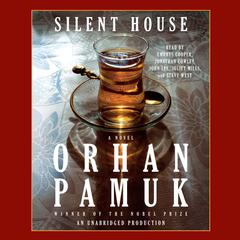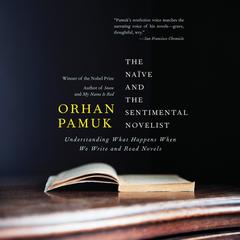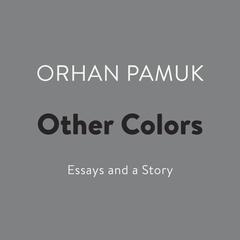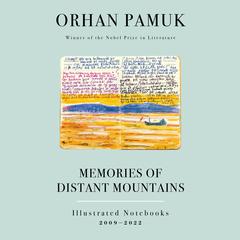 Play Audiobook Sample
Play Audiobook Sample
The Museum of Innocence Audiobook
 Play Audiobook Sample
Play Audiobook Sample
Quick Stats About this Audiobook
Total Audiobook Chapters:
Longest Chapter Length:
Shortest Chapter Length:
Average Chapter Length:
Audiobooks by this Author:
Publisher Description
“It was the happiest moment of my life, though I didn’t know it.” So begins the new novel, his first since winning the Nobel Prize, from the universally acclaimed author of Snow and My Name Is Red. It is 1975, a perfect spring in Istanbul. Kemal, scion of one of the city’s wealthiest families, is about to become engaged to Sibel, daughter of another prominent family, when he encounters Füsun, a beautiful shopgirl and a distant relation. Once the long-lost cousins violate the code of virginity, a rift begins to open between Kemal and the world of the Westernized Istanbul bourgeosie—a world, as he lovingly describes it, with opulent parties and clubs, society gossip, restaurant rituals, picnics, and mansions on the Bosphorus, infused with the melancholy of decay—until finally he breaks off his engagement to Sibel. But his resolve comes too late. For eight years Kemal will find excuses to visit another Istanbul, that of the impoverished backstreets where Füsun, her heart now hardened, lives with her parents, and where Kemal discovers the consolations of middle-class life at a dinner table in front of the television. His obsessive love will also take him to the demimonde of Istanbul film circles (where he promises to make Füsun a star), a scene of seedy bars, run-down cheap hotels, and small men with big dreams doomed to bitter failure. In his feckless pursuit, Kemal becomes a compulsive collector of objects that chronicle his lovelorn progress and his afflicted heart’s reactions: anger and impatience, remorse and humiliation, deluded hopes of recovery, and daydreams that transform Istanbul into a cityscape of signs and specters of his beloved, from whom now he can extract only meaningful glances and stolen kisses in cars, movie houses, and shadowy corners of parks. A last change to realize his dream will come to an awful end before Kemal discovers that all he finally can possess, certainly and eternally, is the museum he has created of his collection, this map of a society’s manners and mores, and of one man’s broken heart.
A stirring exploration of the nature of romantic attachment and of the mysterious allure of collecting, The Museum of Innocence also plumbs the depths of an Istanbul half Western and half traditional—its emergent modernity, its vast cultural history. This is Orhan Pamuk’s greatest achievement.
Download and start listening now!
"I like the 3rd dimension of this book ,the fact that it extends to physical reality, that is the museum of innocence built in Istanbul. It opened much later than the book was published. I will make it my mission to see it on my next visit to my home city ."
— Yasemin (4 out of 5 stars)
Quotes
-
“[An] enchanting new novel of first love painfully sustained over a lifetime…Part of the delight in The Museum of Innocence is in scouting out the serious games, yet giving oneself over to the charms of Pamuk’s storytelling…Freely’s translation captures the novelist’s playful performance as well as his serious collusion with Kemal. Her melding of tones follows Pamuk’s agility to redirect our vision to the gravity of his tale…What’s on show in this museum is the responsibility to write free and modern.”
— New York Times Book Review -
“Spellbinding…A resounding confirmation that Orhan Pamuk is one of the great novelists of his generation. With this book, he literally puts love in our hands.”
— Washington Post -
“Mesmerizing, brilliantly realized…Deeply and compellingly explores the interplay between erotic obsession and sentimentality…There is a master at work in this book…Istanbul—its sounds, its smells, its history—permeates everything.”
— Los Angeles Times -
“Stunningly original…Engrossing and sensual…Granular and panoramic, satirical and yet grounded in reality…Great writers have made the failed love stories of desperate, self-involved men pulsate. A master, like Pamuk, makes the story feel vital.”
— Associated Press -
“Pamuk has created a work concerning romantic love worthy to stand in the company of Lolita, Madame Bovary, and Anna Karenina…[Pamuk] is as accomplished an anatomist of love as Stendhal or Hazlitt in Liber Amoris…Kemal’s narrative crosses decades, assembling a fascinating social world of families, friends, and dependents, a rich palimpsest of the lives and mores of Istanbul’s haute bourgeoisie.”
— Financial Times -
“Enchanting…A tour de force…Museum digs deep into memory, and the inescapability of the past. And just as Dostoyevsky did in critiquing a Russia that looked outward to Europe rather than inward to find its soul, Pamuk portrays an upper class that takes its cues from the West, while threatening to dislodge itself from its native culture…Pamuk’s triumph is that you wish Kemal would stay a while longer.”
— Philadelphia Inquirer -
“[The Museum of Innocence] grabs and compels us, in prose that is deliberate, thoroughgoing, meticulous…What clarifies breathtakingly by book’s end—perhaps its secret heart—is the inverse story that is Füsun’s: the quiet indictment of a culture locked into ancient mores that suffocated women to death.”
— San Francisco Chronicle -
“[Pamuk’s] most accessible novel and his most profound…Following the spirit of Marcel Proust or another Turkish writer, Ahmet Hamdi Tanpinar, the novelist’s art is to accumulate detail in ‘a “sentimental museum” in which each object shimmers with meaning.’”
— Economist -
“A world-class lesson in heartbreak and happiness…Pamuk’s own presence in this wily narrative is as surreptitious as passion itself.”
— O, The Oprah Magazine -
“A charmingly old-fashioned love story whose principal interest lies in the author’s warm-hearted evocation of his milieu: Istanbul is Pamuk’s city like Dublin was Joyce’s or Chicago Bellow’s.”
— Denver Post -
“A virtuoso comment on East and West.”
— Cleveland Plain Dealer -
“[Pamuk] once again distinguishes himself by creating this romance that in its magnitude and ingenuity reaches the level of literature’s greatest romances…Beyond the brilliant story line and the exquisite writing and imagery lies the soul of a man laid bare, a man who we should find at best intolerable (and at worst possibly despicable) but who yet finds such joy in this single-minded love that we cannot help but admire him…It is in this duality that we glimpse Pamuk’s genius.”
— Chattanooga Times Free Press -
“A belletristic banquet…Pamuk describes Kemal’s decline with operatic drama and painterly flair…His writing [is] lush, grand, and masterful.”
— Louisville Courier-Journal -
“An alluring story—big in every way in Pamuk’s hands.”
— Milwaukee Journal Sentinel -
“Pamuk’s sensual, sinister tale is a brilliant panorama of Turkey’s conflicted national identity—and a lacerating critique of a social elite that styles itself after the West but fails to embrace its core freedoms.”
— Vogue -
“An enthralling, immensely enjoyable piece of storytelling…The large-scale social portraiture of The Museum of Innocence is beautifully assured; lightly satirical but also affectionate; a very tender evocation of Istanbul’s moment of dolce vita.”
— Guardian (London) -
“Exquisite…An expansive, delicate, and deceptively straightforward romance…Against the backdrop of a shifting, evolving city, attracted to, yet skeptical of, the West, Pamuk gracefully, at times teasingly, pursues his themes of memory, custom, and sacrifice.”
— Daily Mail (London) -
“This is the greatest novel of the new century…In its sensuousness of the life observed, its Olympian insight into the clashes of classes and professions, and its fearlessness in tackling the great themes of human existence without dilution by showiness, tricks, or superficiality, it evokes the great novels of love and obsession by Balzac, Stendhal, Flaubert, Dostoevsky, Tolstoy, and Mann.”
— New Leader -
[An] enchanting new novel of first love painfully sustained over a lifetime....The city is on exhibit: the romantic touch of decaying wooden houses, the sturdy apartments of the nouveaux riches, postcard views of the shimmering Golden Horn, Soviet tankers on the Bosporus and a Frenchified restaurant once in favor....Part of the delight in The Museum of Innocence is in scouting out the serious games, yet giving oneself over to the charms of Pamuk’s storytelling….Freely’s translation captures the novelist’s playful performance as well as his serious collusion with Kemal. Her melding of tones follows Pamuk’s agility, to redirect our vision to the gravity of his tale....What’s on show in this museum is the responsibility to write free and modern.
— Maureen Howard, New York Times Book Review -
A Startling original. Every turn in the story seems fresh, disquieting, utterly unexpected...spellbindingly told....The genius of Pamuk’s novel is that although it can be read as a simpel romance, it is a richly complicated work with subtle and intricate layers. Kemal’s descent into love’s hell takes him through every level of the social order, past countless neighborhoods of sprawling Istanbul, in a story that spans 30 years.
— Marie Arana, The Washington Post -
Pamuk...is that rare thing, a creator of sophisticated, intensely literary fiction, who is also his country’s bestselling writer....in part...because of his work’s accessibility and his willingness to adapt conventionally popular genres, like historical and detective stories, into multilayered, character-driven novels....mesmerizing, brilliantly realized...[with] marvelous and transporting evocations of Istanbul…and fascinating insights into a society living very much on the unstable borders of contemporary life between the Islamic and Western worlds....[This] engrossing tale....deeply and compellingly explores the interplay between erotic obsession and sentimentality—and never once slips into the sentimental. There is a master at work in this book.
— Timothy Rutten, The Los Angeles Times -
Pamuk looks at Europe’s great tradition with a fascination and devotion that few contemporary Europeans would muster…and in doing so, he catches instantly his own—along with his country’s and much of the developing world’s—uneasy position between the indigenous ways they are determined to hold on to and the globalized world they long to belong to. The Museum of Innocence may be Pamuk’s most intimate and nuanced exploration of these stresses yet....Pamuk unfolds a classic, spacious love story a little like a Nabakovian version of Love in the Time of Cholera [and] The Museum of Innocence develops, therefore, into something of a rich and almost-modern Age of Innocence, translated to a confused world that doesn’t know quite how modern it wants to be....[N]o one has given us so unsparing and precise a sense of mock-sophisticated Istanbul society, and no writer has immersed us so passionately in a backward-looking monochrome depiction of Istanbul in its neglected traditional corners....[Pamuk] has given voice to nearly every society in the world torn between the longing to be global and to be itself....[Here he] manages to tell a very straightforward story of a dreamer in love—rendered lucid and fluent and human in Maureen Freely’s translation—that is, beneath its romantic surface, strikingly exact.
— Pico Iyer, New York Review of Books -
While this is a broadly familiar tale, it is also, in so many ways, a stunningly original work…granular and panoramic, satirical and yet grounded in reality. This is a twisted love story, engrossing and sensual in its own right. But Pamuk being Pamuk, it is so much more than that. There is something casually anthropological about Pamuk’s writing. He manages to make a story with stern lessons about class conflicts and…the Eastern versus Western divide, feel both light and weighty. Pamuk is a puckish storyteller…who crafts scenes worthy of the cinema. Vignettes large and small feel vivid….Great writers have made the failed love stories of desperate, self-involved men pulsate. A master, like Pamuk, makes the story feel vital.
— Henry C. Jackson (Associated Press Writer), San Francisco Chronicle -
Pamuk’s sensual, sinister tale is a brilliant panorama of Turkey’s conflicted national identity—and a lacerating critique of a social elite that styles itself after the West but fails to embrace its core freedoms.
— Vogue -
a world-class lesson in heartbreak and happiness....Pamuk’s own presence in this wily narrative is as surreptitious as passion itself.
— O Magazine -
pulses with the hopeful melancholy of an aching heart.
— Entertainment Weekly -
Curious and demanding….The author examines Kemal’s twisted devotion with impressive cunning and inventiveness; inevitably, we think of Nabokov’s Humbert Humbert and his Lolita, but to Pamuk’s credit, the comparison does not diminish this novel’s eloquence or impact. Suggestions of a tradition-bound haute bourgeoisie unable to let go of passing traditions and values feel honestly earned, and the narrative consistently engages and surprises....Another richly women tale suffused with life and color from one of contemporary fiction’s true master craftsmen.
— Kirkus (starred review) -
a soaring, detailed...mausoleum of love....a masterful work.
— Publisher’s Weekly
Awards
-
One of the 2009 New York Times Book Review 100 Notable Books for Fiction
-
A New York Times bestseller
-
A 2009 Los Angeles Times Best Book for Fiction
-
A 2009 Washington Post Best Book for Fiction
-
A 2009 Kansas City Star Top 100 Book for Fiction
-
Winner of Nobel Prize, 2006
-
Winner of Nobel Prize, 2006
The Museum of Innocence Listener Reviews
-
" The kind of book that makes you want to punch the writer. Numbingly laboured, almost as if Orhan's on a quest to evaluate a reader's capacity for tolerance. Pages on end where he's just toying with the reader. A man falls in love at the beginning of the story, to a shop girl while in line to be engaged to another, goes ahead and gets engaged while in the meantime carrying on an affair with the said shop girl, who a few months later is married off. And here begins the plod, over four hundred pages of which you are treated to the prospect of a man letting go of himself. It's not so much the bleakness, or the melancholy, it's the contrivance by Pamuk to have us sit through hundreds of pages in which the protagonist, Kemal, slides along the "I'm over her, I hate her. No I love her still, I can't live without her'' scale. The prose is excellent, the scale of the novel robust enough yet I find it absolutely infuriating. "
— Vincent, 2/10/2014 -
" Started off so well couldn't put it down till page 377 after that it loses the plot and drags on for couple of hundred pages... A shame :( "
— Nausheen, 2/3/2014 -
" Very, very long. Like The White Castle, Pamuk moves slowly through a long period of time with much focus on minutia. "
— S, 1/23/2014 -
" The book was disappointing. I really wanted to like it, but 1/3 into the book, I realized that it was not living up to my expectation of it. It was slow in parts, the characters were not sympathetic nor were they adequately fleshed out. I expected more from this prize winning author. "
— Christine, 11/21/2013 -
" The protagonist is obsessive about a doomed romance of the past. The author is Turkish, and I enjoy many of the references to places I have visited and interpretations of Turkish mores. However, his obsession is getting to be a drag. "
— Ellie, 11/20/2013 -
" One of the most beautifully written books I have ever come across.. A "Must Read" "
— Sylvia, 10/24/2013 -
" Based on a couple of pages, this author deserved his nobel prize in literature. His words wax lyrical poetic on love and agony. "
— Melanie, 10/23/2013 -
" I couldn't put it down which was unfortunate because I needed to finish the semester's chores! "
— Becky, 4/4/2013 -
" Still not sure what to think- wanted to read it since it was something different and he was an award winning author. The ending still has me thinking. "
— Cheryl, 2/6/2013 -
" A very personal experience. Difficult to review. "
— Nivedita, 12/11/2012 -
" The story centered around the main character's obsession with a woman, and I found myself not interested at all in the relationship. Also, it seemed like a chore to get through a lot of the long descriptive passages. "
— Heather, 11/25/2011 -
" Stange story with a twist of bizare. Not my cup of tea "
— Jo-dee, 5/22/2011 -
" REALLY disliked this book. Tragically long and I wanted to beat the main character with a Nerf bat by 200 of 750. Nobel Prize in Literature - all I can say is that the author must have naked photos of members of the Nobel committee to bribe them with. "
— Adrienne, 5/15/2011 -
" Story had a passionate beginning but then became slow and tedious, perhaps to show the reader the extent of the protagonist's obsession. Rather than captivate and earn my compassion, I skipped and skimmed several chapters to reach the conclusion--which was predictable. "
— Vicki, 5/10/2011 -
" Brilliant read! Characters that with you and windows into Ataturk's Turkey. "
— Yon, 4/30/2011 -
" Stange story with a twist of bizare. Not my cup of tea "
— Jo-dee, 4/22/2011
About Orhan Pamuk
Orhan Pamuk is a prominent literary author who won the Nobel Prize for Literature in 2006. His novel My Name Is Red won the 2003 IMPAC Dublin Literary Award, and his numerous novels have been translated into more than sixty languages. He lives in Instanbul.
About John Lee
John Lee is the winner of numerous Earphones Awards and the prestigious Audie Award for Best Narration. He has twice won acclaim as AudioFile’s Best Voice in Fiction & Classics. He also narrates video games, does voice-over work, and writes plays. He is an accomplished stage actor and has written and coproduced the feature films Breathing Hard and Forfeit. He played Alydon in the 1963–64 Doctor Who serial The Daleks.




































